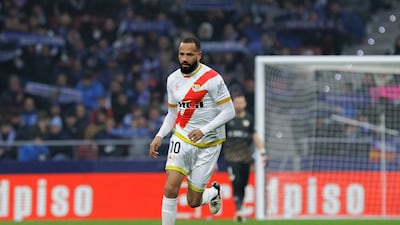The delighted shout of recognition comes from a few rows back in the aircraft. “Manchester United!” shouts a passenger.
Tiago Manuel Dias Correia, universally known as Bebe, turns to smile. His Manchester United days were a long time ago, but people still recall Bebe as a United player partly because of all the diverting stories around him.
We are on board last Thursday’s packed flight from Casablanca to Abidjan, and the most purposeful travellers are set apart by their livery, tracksuits bearing the emblem of the Cape Verde Islands.
They embark on their fourth Africa Cup of Nations finals this afternoon and it is a measure of their rise that they were Afcon debutants only 11 years ago, yet would regard not reaching the knockouts, even from a group including Ghana, Sunday’s opponents, and Egypt as falling short.
But Cape Verde are still minnows in some respects. The squad are in economy class en route to Ivory Coast – other, wealthier national teams would be seated at the front end of the cabin – but evidently relishing the adventure.
There’s no disguising that Bebe, enjoying a successful eighth season at Rayo Vallecano of Spain’s top division, is the squad’s figurehead. He speaks to eagerly curious passengers in fluent Spanish and English. Younger teammates direct their banter, in Portuguese, at him, seeking his approval.
His nickname, meaning ‘Baby’ and given to him as a child, has certainly outlasted its logical lifespan. Bebe, at 33, is very grown-up, a man who has known hard extremes on the way to a top-flight club career and now the added, late bonus of a first major international tournament.
Like most of the Cape Verde squad, he was born outside the islands to parents with Cape Verdean heritage. It’s a typical story because the overseas diaspora outnumbers the small population – less than 600,000 – of residents.
It took a long while for Bebe, who had played a handful of times on the wing for the under-21s of his native Portugal, to get through Fifa’s bureaucratic procedures to establish his eligibility.
“He was persistent,” recalls the team’s manager, Pedro Leitao ‘Bubista’ Brito, “and these things can be a painful ordeal. I saw how determined he was.”
And there were complications in neatly documenting Bebe’s family tree. He was born into difficult circumstances, left by his parents as an infant in the care of a grandmother and then social services.
Among the extensive tattoos on Bebe’s six-foot-three frame is the word Gaitao, the name of the orphanage where he spent almost a decade. “It’s where I learnt you have to work hard for everything,” he reflected after touching down in Ivory Coast.
It’s where Bebe gathered he had a talent, although it would develop at a remove from the sorts of bespoke academies that typically fast-track a modern professional. He played in tournaments for the homeless. The rapid jump from there to one of the most followed football clubs in the world would be startling.
When Manchester United signed Bebe, then just turning 20, it was a bolt from nowhere. He had played a single season in the Portuguese second division. The United manager, Alex Ferguson, had endorsed the transfer almost entirely on the recommendation of his trusted former second-in-command, Carlos Queiroz.
It was not an easy time to join United, either, a year after they had sold a superstar Portuguese winger – one with Cape Verdean heritage, as it happens – named Cristiano Ronaldo. And Bebe was no Ronaldo. When he played, he could look very raw.

By the time he turned 21, United deemed Bebe not ready for the first team. Out he went on loan: to Besiktas, to Rio Ave and Pacos de Ferreira. He signed for Benfica in 2014. They lent him elsewhere: to Cordoba, to the Madrid club Rayo, where eventually he would find a place to call home, where fans would cheer him long and loud as one of their favourites.
Ferguson may have concluded, a dozen years ago, Bebe was not ready for the pressures of United, but his sense there were special gifts within the naive kid was right.
The matured, settled Bebe is trusted by Rayo to mix endeavour with the trickery that was always part of his make-up. He calls himself a “street footballer”. It’s an overused term but authentic for Bebe, whose learning in the sport were anything but orthodox.
Footballers speak often of “humility”, too. “It’s an easy thing to say, harder to actually mean,” Bebe has said. It’s the word Bubista, his Cape Verde coach, reaches for to talk about Bebe the international, leader of a squad whose resources are limited but momentum strong.
“He sets an example with his experience, humility, straightforward attitude and open personality,” Bubista tells The National. “We’re a calmer team with him around. He spent four years trying to be with us, and everyone appreciates that perseverance.”
To Bebe’s frustration, he was unable to join the Cape Verde expedition to the last Afcon, where they reached the last 16, losing to winners Senegal. But since he marked his first two internationals with three goals, Bubista says, “he's become extremely important, on and off the pitch.
He will turn up for all the friendlies, even against ‘lesser’ teams, which is a sacrifice because he is travelling a long way from Rayo.
“He’s helped persuade other dual-nationals to commit to Cape Verde. They hear him talk about the set-up and see it’s well-run even if we’re not a traditional power in Africa. And he tells them there’s a really good vibe, which he is a big part of. I’m really happy for him to be at his first big tournament.”
The first of a few? “The team we have now has hunger and experience,” says Bubista, “and we set high targets.” Here’s one: “Africa will have nine teams at the 2026 World Cup,” Bubista points out. “Of course that’s in our sights.”


